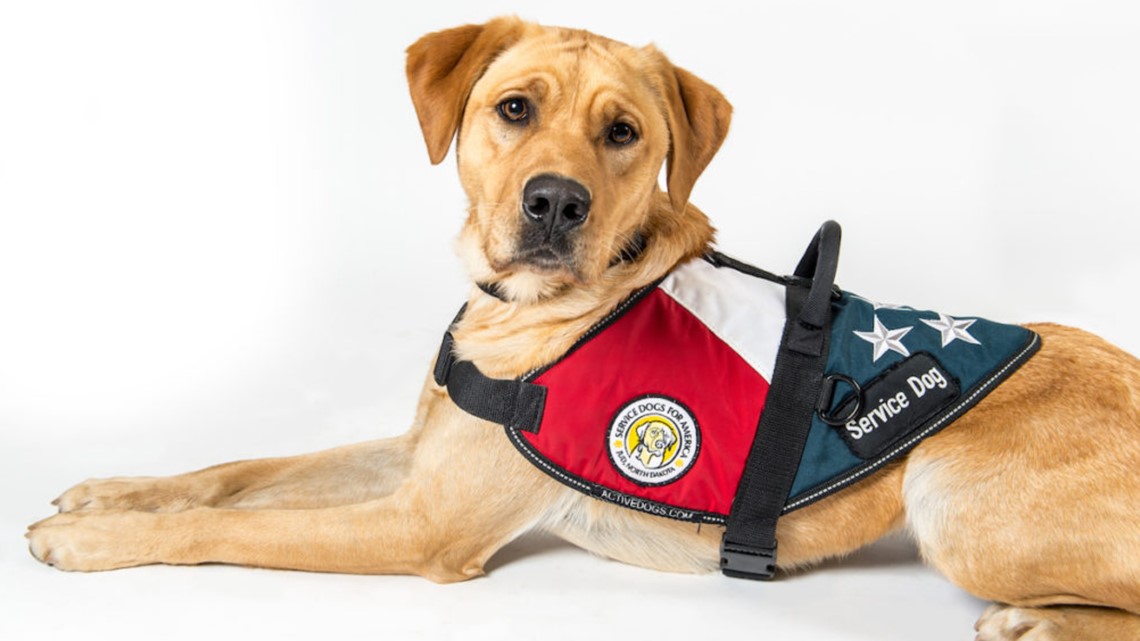New Texas law increases fines for fake service animals

Some Texas pet owners are confused by a new law that increases penalties for misrepresenting a dog as a service animal.
HOUSTON — One of the nearly 800 new Texas laws now in effect is getting a lot of attention from pet owners.
House Bill 4164 increases the penalty for people misrepresenting their dogs as service animals when they are not specially trained. Fines for violating the law have increased from $300 to $1,000 and 30 hours of community service.
Advocates say they fought for the change to protect people with disabilities and their service animals.
“In recent years, there has been an increase in the number of non-disabled people that represent their pets as service animals,” explained Shelby Bobosky with the Texas Humane Legislation Network. “It’s really evident when you bring an untrained or misbehaved dog into a restaurant and you can see them jumping on a table, barking — that is definitely not a service animal.”
While some public establishments do allow non-service animals, including emotional support dogs, they’re not required to under the law.
“Maybe those people that have bought those fake vests and fake certificates will think twice about taking advantage of it,” Bobosky said.
A lot of Texas pet owners are confused by the difference between a service animal, an emotional support animal and a therapy or comfort animal so we broke down the key differences.
What is a service animal?
Under Title II and Title III of the Americans with Disabilities Act (ADA), a service animal means any dog that is individually trained to do work or perform tasks for the benefit of an individual with a disability, including a physical, sensory, psychiatric, intellectual or other mental disability.
Examples of service dogs:
- Providing physical support and assistance for people who use wheelchairs or have other mobility disabilities.
- Assisting individuals who are blind or have low vision with navigation.
- Alerting a person with hearing loss to a sound.
- Detecting an oncoming seizure and assisting an individual during the seizure.
- Reminding a person to take medication.
- Helping individuals with psychiatric and neurological disabilities by preventing or interrupting impulsive or destructive behaviors.
- Helping people with PTSD by applying pressure to alleviate anxiety, nud
ging to interrupt flashbacks or licking their hand to alert them to an oncoming panic attack.
People who rely on service animals as defined by the ADA are protected from discrimination under federal and state laws.
- No common carrier, airplane, railroad train, motor bus, streetcar, boat, or other public conveyance or mode of transportation operating in the state may refuse as a passenger a person with a disability because of the disability, nor may a person with a disability be required to pay an additional fare because of their use of a service animal, wheelchair, crutches, or other device used to assist them in travel.
- No person with a disability may be denied admittance to any public facility in the state because of their disability. No person with a disability may be denied the use of a white cane, assistance animal, wheelchair, crutches, or other device of assistance.
- A person with a total or partial disability who has or obtains a service animal is entitled to full and equal access to all housing accommodations, and may not be required to pay extra compensation or make a deposit for the animal but is liable for damages done to the premises by the animal except for reasonable wear and tear.
- A service animal in training must not be denied admittance to any public facility when accompanied by an approved trainer.
- A person may not assault, harass, interfere with, kill, or injure in any way, or attempt to assault, harass, interfere with, kill, or injure in any way, an assistance animal.
- A person is not entitled to make demands or inquiries about the qualifications or certifications of a service animal for purposes of admittance to a public facility except to determine the basic type of assistance provided by the service animal to a person with a disability.
- If a person’s disability is not readily apparent, for purposes of admittance to a public facility with a service animal, a staff member or manager of the facility may inquire about:
- whether the service animal is required because the person has a disability; and
- what type of work or task the service animal is trained to perform.
Do you have to provide proof in public places that your pet is a service animal?
Enforcing the new Texas law could be tricky for a few reasons.
- The ADA doesn’t require service animals to wear a vest, ID tag or specific harness.
- Under the ADA, a public accommodation or facility is not allowed to ask for documentation or proof that the animal has been certified, trained or licensed as a service animal.
- They are also not allowed to demand a demonstration of the tasks the service animal can perform.
- The ADA also limits other questions that can be asked. When a person who claims to have a service animal enters a public place, the person cannot be asked about the nature or extent of his or her disability. Only two questions can be asked:
- Is the animal required because of a disability?
- What work or task has the animal been trained to perform?
If the answer to question 1 is yes and the tasks listed for question 2 are directly related to the person’s disability, then the animal is a service animal.
What is an emotional support animal?
Not all animals that individuals with a disability rely on meet the definition of a service animal for purposes of ADA.
According to the U.S. Department of Housing and Urban Development (HUD), an emotional support animal provides support by alleviating symptoms or causes of a person’s disability.
Emotional support animals provide companionship, relieve loneliness, and sometimes help with depression, anxiety and specific phobias. However, they don’t have special training to perform tasks that assist people with disabilities. Emotional support animals are not limited to dogs.
Even if you have a note from a doctor that states you have a disability and need the animal for emotional support, it’s not enough to qualify as a service dog. “A doctor’s letter does not turn an animal into a service animal,” the ADA says on its website.
Beware of websites that sell service animal certification or registration documents online. These documents don’t provide protection under the ADA and the Department of Justice doesn’t recognize them as proof that the dog is a service animal.
Common household animals are allowed as emotional support animals in housing but the landlord may ask for documentation, animal lawyer Randy Turner said.
At the workplace, an emotional support animal may qualify as a “reasonable accommodation” if it’s “not an undue hardship on the employer or a threat to the health, safety or welfare of others,” according to Turner. He said the employer may ask for documentation.
Most airlines no longer allow emotional support animals to fly free but dogs and cats under 20 pounds are allowed for a fee.
What about a comfort animal or therapy animal?
Both types of animals, typically dogs, work in situations where stress levels are high.
Comfort animals work during active crises. They offer a calming distraction to those impacted by an active disaster or emergency.
Therapy animals provide people with healing contact, typically in an institutional or clinical setting, to improve their physical, social, emotional, or cognitive functioning. They may receive extensive training but since they are not trained to perform a specific task for an individual with a disability, they’re not considered service animals.
https://www.wfaa.com/article/life/animals/texas-law-service-animal-emotional-support-dog/285-be7eb241-eb8e-4033-a6e8-197994a14ad3 New Texas law increases fines for fake service animals


